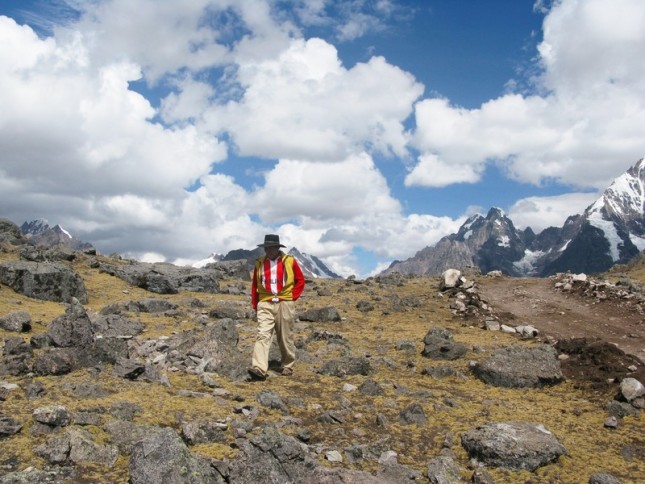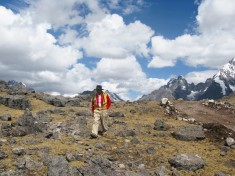-
It’s Time We Scale Up Climate Leadership
March 17, 2020 By Tegan Blaine The urgency to address climate change is only growing. As youth step up and are increasingly vocal about climate change, international negotiations—most recently at COP25—fail to deliver the ambitious global action required for effective response.
The urgency to address climate change is only growing. As youth step up and are increasingly vocal about climate change, international negotiations—most recently at COP25—fail to deliver the ambitious global action required for effective response.Where does this leave the communities most at risk from climate impacts? How can they adapt and transform in the face of enormous threats, sometimes to their very existence? With researchers and policy experts often focused on technological fixes and pushing new solutions to specific threats, it’s easy to assume that transformation is underway to respond to the new climate reality. In reality, transformative change is tough—especially when up against ingrained habit, culture, and a lack of political and financial resources to support it. Perhaps most importantly, transformative change requires effective leadership and champions—those people who build political will and create momentum to move policy innovations or on-the-ground action.

The urgency to address climate change is only growing. As youth step up and are increasingly vocal about climate change, international negotiations—most recently at COP25—fail to deliver the ambitious global action required for effective response.
Where does this leave the communities most at risk from climate impacts? How can they adapt and transform in the face of enormous threats, sometimes to their very existence? With researchers and policy experts often focused on technological fixes and pushing new solutions to specific threats, it’s easy to assume that transformation is underway to respond to the new climate reality. In reality, transformative change is tough—especially when up against ingrained habit, culture, and a lack of political and financial resources to support it. Perhaps most importantly, transformative change requires effective leadership and champions—those people who build political will and create momentum to move policy innovations or on-the-ground action.
The World Resources Institute’s recent report, “From Planning to Action: Mainstreaming Climate Change Adaptation into Development” underscores the importance of “sustained, persistent leadership” at multiple levels and, in particular, the role of champions (see also this recent interview with Roger Pulwarty). Effectively responding to climate change will require many, many champions, operating across all scales of governance and in multiple sectors, including the private sector, NGOs, and more. So what if we put as much effort into scaling up climate leadership as we do in scaling up technologies and toolsets? Here are some thoughts about where we could start:
Expand our notion of climate change leadership and climate change “champions.” Let’s seek out and support the less visible leaders—those individuals who are clear-eyed about the challenges their communities face, who can articulate community values and concerns, whom people quietly turn to for guidance, and who are influential in informally shaping community opinion. Perhaps these people are religious leaders, perhaps they are active members in a farm cooperative or women’s lending group. Such “emergent leadership” could help build community commitment and action in more sustainable and long-lasting ways. How do we identify, develop, and support these leaders? What do they need to be more effective – perhaps training to influence senior decision-makers who control funding and other resources that could support transformation? What other models of leadership could we learn from and promote? Identifying and supporting a wider group of potential climate leaders could help open up new opportunities to support transformation.
Adapt lessons from the behavior change community. Recent works on behavior change highlight the importance of connections, not just to family, but to community and to services and support, as determinants of behavior. Individuals’ perception of their risk and confidence in being able to influence an outcome also shape their decisions to implement change. Understanding how decisions are influenced is key to guiding communities through challenging transformations.
Engage communities more effectively in designing their own futures. Community engagement requires that traditional leaders relinquish some of their power, and can be time-intensive and hard to sustain. Yet such engagement tends to yield practical solutions with more staying power; initiatives emerge from input from different parts of the community and integrate local knowledge, and the process itself builds commitment, trust, and empowers local communities and networks. How do we help local leaders engage communities deeply and more effectively? What is required to sustain community engagement and deepen commitment over the long term? Empowering communities to lead their own approach on climate change could result in more profound and effective strategies.
The world is not on track to limit climate change and address its impacts. Leadership is needed at every level to help communities and individuals move towards the transformative social, economic, and political changes required to address climate change. It is time to consider scaling up leadership as a critical approach to tackling our shared, urgent challenges.
Tegan Blaine has worked on climate science, policy, and international development for over 20 years, including heading up the climate change team in USAID’s Bureau for Africa for over a decade. She is now an independent consultant on climate change and resilience.
Sources: ClimateLinks, Future Earth, Integrated SBCC Programs Implementation Kit, Penn State University, World Resources Institute
Photo Credit: Silverio Landio, Pacchanta Community Leader. Helena Christensen/Oxfam
 A Publication of the Stimson Center.
A Publication of the Stimson Center.

 The urgency to address climate change is only growing. As youth step up and are increasingly vocal about climate change, international negotiations—most recently at COP25—fail to deliver the ambitious global action required for effective response.
The urgency to address climate change is only growing. As youth step up and are increasingly vocal about climate change, international negotiations—most recently at COP25—fail to deliver the ambitious global action required for effective response.

